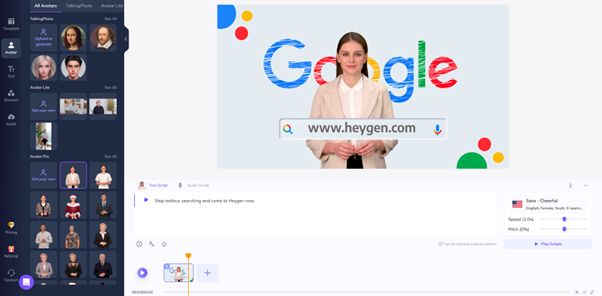In recent times, Generative AI has become ubiquitous. The past year has witnessed a surge in impressive AI-generated artworks showcased by people, thanks to advancements in text-to-image algorithms introduced by groups like OpenAI and Stability AI. Consequently, a plethora of startups is now devising applications for this novel language model that enables machines to create new text, images, and videos based on simple human input.
HeyGen, a two-year-old startup, is one of these companies that utilize generative AI and other machine learning frameworks like GAN to produce videos that feature talking human avatars. The platform is geared towards marketers, offering a drag-and-drop interface similar to Canva. Users select a template such as a theme for a shopping site or a trip to Japan and then add a hyperrealistic avatar to serve as the video’s “spokesperson,” with speech generated by text input. With a simple click, users can swap the outfit, face, and voice of the AI-generated human.
Formerly known as Movio.la, HeyGen is excited to announce a rebranding to HeyGen.com. This new brand identity reflects the company’s unwavering dedication to delivering innovative generative AI-driven video solutions that empower creators, marketers, and businesses in their content creation process. Despite the name change, HeyGen’s commitment to providing exceptional user experiences and cutting-edge AI technology remains unchanged.
Currently, HeyGen has a user base of several four hundred thousand users, with nearly three thousand paying customers. The company has secured approximately $9 million in funding from investors, including IDG, Sequoia Capital China, and, most recently, Baidu Ventures. The co-founder and CPO of HeyGen, Xu, met his co-founder Liang Wang while studying at Carnegie Mellon University. Wang is a veteran of ByteDance and the music social network Smule.
In a previous report, we highlighted HeyGen’s successful application of deepfake technology. At the time, the company was named Surreal and was based in Shenzhen, which is renowned for its thriving hardware industry and robust e-commerce sector. Many of Amazon’s sellers come from the city, which is also where merchants were utilizing HeyGen to create promotional videos narrated by synthesized humans, thereby eliminating the need to hire real human models.

HeyGen has recently relocated to Los Angeles, where co-founder and CEO Josh Xu previously worked as a Snap engineer for six years. The reason for the move is that the startup aims to capitalize on the growing trend of marketers embracing AI tools to aid in their work.
According to Xu, “We are doing what Jasper and Copy.ai do but for video production.” Jasper and Copy.ai are two of today’s top AI content assistants. Xu envisions a future where marketers can use talking human avatars instead of plain text in emails, emphasizing the power of videos.
While HeyGen is currently limited to synthesizing talking heads, the company is actively working towards a future where its algorithms can generate full-body movements. Achieving this goal will bring HeyGen closer to its objective of being an “all-in-one AI video production platform.”
Users of the startup are charged based on the length of their videos, which is determined by the submitted script. For those utilizing customized faces, a popular feature in corporate training, an additional premium fee is charged. Third-party websites can also access HeyGen’s API, with some using the engine to create pop-up customer support avatars.
According to Xu, “AI-generated video is just a small segment within the AIGC [AI Generated Content] industry. We’ve seen how much text-to-image can accomplish, and I believe that text-to-video will bring even more significant disruption when it becomes available.”

